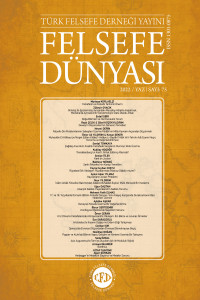Abstract
Bu çalışmanın amacı, ‘nasıl oluyor da düşünürken tahrif edilmiş bir gerçekliği kullansak da pratik sonuç hala doğru oluyor?’ sorusunu açıklamaya çalışan ‘Sanki Felsefesi’nin Kantçı temellerini anlaşılır kılmaktır. Vaihinger eserinde mitlerin, dini inançların ve hatta bilimsel kavramların bir kurgu olduğunu ve insanoğlunun hakikat arayışında sık sık kurgulara başvurduğunu savunur. Hem bu düşünceyi örneklendirmek hem de kurguların yapısını anlaşılır kılmak için de Kant felsefesinden faydalanır. Kant’ın da sıkça başvurduğu kurgular ontolojik ya da teorik herhangi bir gerçekliğe sahip olmasalar da Kant’ın felsefesinde olduğu gibi ‘şey’leri anlamak için gereklidirler.
References
- • Güngör, Irmak, ‘Neden Kavramı ve Nedensellik İlkesi’ Metafizik: Kavram ve Problemleri ile Varlık Felsefesi içinde, Ed.: A. Kadir Çüçen, Sentez Yayıncılık, Bursa, 2018.
- • Kant, I., Ahlâk Metafiziğinin Temellendirilmesi, Çev.: Ioanna Kuçuradi, Türkiye Felsefe Kurumu Çeviri Dizisi:4, Ankara, 2002.
- • Kant, I., Arı Usun Eleştirisi, Çev.: Aziz Yardımlı, İdea Yayınevi, İstanbul, 2019.
- • ………, Gelecekte Bir Bilim Olarak Ortaya Çıkabilecek Her Metafiziğe Prolegomena, Çev.: Ioanna Kuçuradi-Yusuf Örnek, Türkiye Felsefe Kurumu Çeviri Dizisi: 3, Ankara, 2002.
- • ……..., Lectures on Logic, Translated and Edited By J. Michael Young, Cambridge University Press, Printed in the United States of America, 1992.
- • ……..., Pratik Usun Eleştirisi, Çev.: Ioanna Kuçuradi, Ülker Gökberk, Füsun Akatlı, Türkiye Felsefe Kurumu Çeviri Dizisi:2, Ankara, 1999.
- • ……..., Saf Aklın Sınırları Dahilinde Din, Çev.: Suat Başar Çağlan, Literatürk Yayınları, Konya, 2017.
- • Kollektif, Bilim ve Düşünce Kitap Dizisi 3: Pozitivizm, Evrensel Basım Yayın, İstanbul, 2006.
- • Mayer, Frederick,Yirminci Asırda Felsefe, Çev.: Vahap Mutal, Dergâh Yayınları, İstanbul, 1992.
- • Möngü, Bahtinur, Josiah Royce’un Metafiziği (Yayınlanmış Doktora Tezi), Kriter Yayınları, İstanbul, 2019.
- • Podnieks, K., ‘Philosophy of Modeling in the 1870s: A Tribute to Hans Vaihinger’, Baltic Journal of Modern Computing; Riga Vol. 9, Iss. 1, (2021), DOI:10.22364/bjmc.2021.9.1.05.
- • Vaihinger, H., The Philosophy of ‘As If’: a System of the Theoretical, Practical and Religious Fictions of Mankind (Second Edition), Translated by C. K. Ogden, London: Kegan Paul and Co., Ltd.; New York: Harcourt, Brace and Co., Inc., 1935.
- • https://tr.wikipedia.org/wiki/Netkuvvet (Erişim Tarihi: 14.06.2021).
- • https://studylibtr.com/doc/556122/topoloji (Erişim Tarihi: 14.06.2021).
Abstract
The aim of this study is to make understandable the Kantian foundations of "As If Philosophy", which tries to explain the question "how come we use a falsified reality while thinking, the practical result still proves to be right?". In her work, Vaihinger argues that myths, religious beliefs and even scientific concepts are fictions and that human beings often resort to fictions in their search for truth. He makes use of Kant's philosophy both to exemplify this idea and to make understandable the structure of the fictions. Although the fictions that Kant frequently refers to do not have any ontological or theoretical reality, they are necessary to understand 'things' as in Kant's philosophy.
Keywords
References
- • Güngör, Irmak, ‘Neden Kavramı ve Nedensellik İlkesi’ Metafizik: Kavram ve Problemleri ile Varlık Felsefesi içinde, Ed.: A. Kadir Çüçen, Sentez Yayıncılık, Bursa, 2018.
- • Kant, I., Ahlâk Metafiziğinin Temellendirilmesi, Çev.: Ioanna Kuçuradi, Türkiye Felsefe Kurumu Çeviri Dizisi:4, Ankara, 2002.
- • Kant, I., Arı Usun Eleştirisi, Çev.: Aziz Yardımlı, İdea Yayınevi, İstanbul, 2019.
- • ………, Gelecekte Bir Bilim Olarak Ortaya Çıkabilecek Her Metafiziğe Prolegomena, Çev.: Ioanna Kuçuradi-Yusuf Örnek, Türkiye Felsefe Kurumu Çeviri Dizisi: 3, Ankara, 2002.
- • ……..., Lectures on Logic, Translated and Edited By J. Michael Young, Cambridge University Press, Printed in the United States of America, 1992.
- • ……..., Pratik Usun Eleştirisi, Çev.: Ioanna Kuçuradi, Ülker Gökberk, Füsun Akatlı, Türkiye Felsefe Kurumu Çeviri Dizisi:2, Ankara, 1999.
- • ……..., Saf Aklın Sınırları Dahilinde Din, Çev.: Suat Başar Çağlan, Literatürk Yayınları, Konya, 2017.
- • Kollektif, Bilim ve Düşünce Kitap Dizisi 3: Pozitivizm, Evrensel Basım Yayın, İstanbul, 2006.
- • Mayer, Frederick,Yirminci Asırda Felsefe, Çev.: Vahap Mutal, Dergâh Yayınları, İstanbul, 1992.
- • Möngü, Bahtinur, Josiah Royce’un Metafiziği (Yayınlanmış Doktora Tezi), Kriter Yayınları, İstanbul, 2019.
- • Podnieks, K., ‘Philosophy of Modeling in the 1870s: A Tribute to Hans Vaihinger’, Baltic Journal of Modern Computing; Riga Vol. 9, Iss. 1, (2021), DOI:10.22364/bjmc.2021.9.1.05.
- • Vaihinger, H., The Philosophy of ‘As If’: a System of the Theoretical, Practical and Religious Fictions of Mankind (Second Edition), Translated by C. K. Ogden, London: Kegan Paul and Co., Ltd.; New York: Harcourt, Brace and Co., Inc., 1935.
- • https://tr.wikipedia.org/wiki/Netkuvvet (Erişim Tarihi: 14.06.2021).
- • https://studylibtr.com/doc/556122/topoloji (Erişim Tarihi: 14.06.2021).
Details
| Primary Language | Turkish |
|---|---|
| Subjects | Philosophy |
| Journal Section | Research Articles |
| Authors | |
| Publication Date | July 15, 2022 |
| Submission Date | July 2, 2021 |
| Published in Issue | Year 2022 Volume: 1 Issue: 75 |

